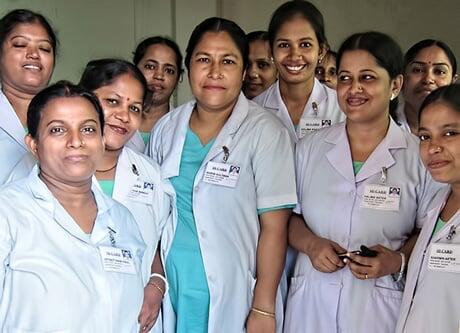NARAYANGANJ, Bangladesh – To make further progress in reducing maternal deaths and disability, Bangladesh is creating a cadre of full-time midwives trained according to international midwifery standards.
Prime Minister Sheikh Hasina has pledged to deploy 3,000 midwives by 2015. UNFPA is supporting the effort.
Hundreds of nurses are now upgrading their knowledge, spending several months in the classroom followed by practical training.
In the district hospital maternity ward one recent morning, trainees were showing new mothers how to breastfeed their babies. Earlier in the day, several helped to stabilize an emergency patient brought in with post-partum bleeding.
Fatima has been a nurse midwife for 12 years, but says she’s learned a lot. “I used to conduct prenatal exams without even asking the patient’s history,” she admits. Now she is trained to provide sensitive, holistic care, interacting with patients in a motherly manner and monitoring their progress throughout their pregnancies.
She has also learned to keep “hands off” during delivery rather than trying to pull the baby out. She can now manage difficult deliveries on her own, knowing when to administer drugs to induce labour or prevent haemorrhaging.
“Our motto is, ‘Practise independently,’” says midwifery trainer Sufia Khatun.
At the same time, the students learn to recognize when a case is too risky and must be referred for surgical delivery.
This summer the first graduates of the programme returned to their hospitals to start using their new skills.
At the health complex in Tongi Bari, midwife Hasne Ara Begum is providing follow-up care to Liza, 20, after the birth of her second son, Jihad. Liza has used oral contraceptives, but sometimes forgot to take the pills; she wants to use a longer-lasting family planning method. Hasne tells her about other options.
A direct-entry midwifery programme will start soon.
– William A. Ryan


